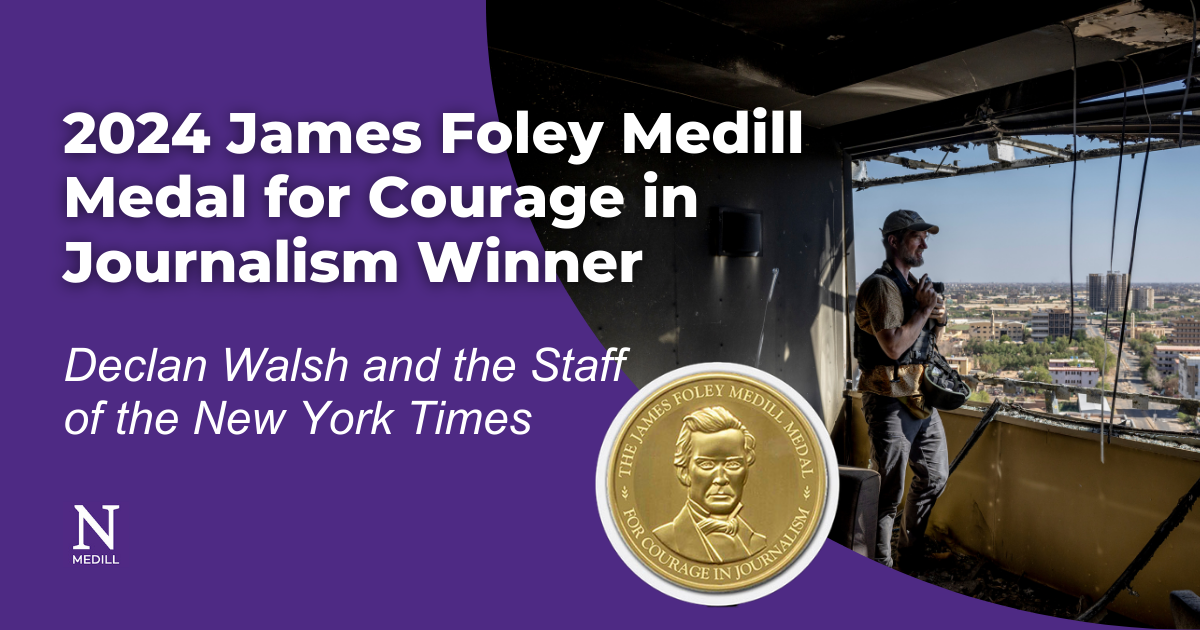Declan Walsh and New York Times Staff Awarded the 2024 James Foley Medill Medal for Courage in Journalism for Sudan War Coverage

EVANSTON, ILL. -- Declan Walsh and the staff of The New York Times were awarded the 2024 James Foley Medill Medal for Courage in Journalism for their groundbreaking coverage of Sudan’s civil war. The award, given annually by Northwestern University’s Medill School of Journalism, Media, Integrated Marketing Communications, recognizes an individual or team of journalists who best display moral, ethical or physical courage in the pursuit of a story or series of stories.
Walsh and his colleagues brought global attention to a brutal conflict that has displaced millions, left hundreds of thousands at risk of starvation and revived the horrors of the Darfur genocide. Their relentless reporting pierced the world’s indifference, revealing not only the atrocities on the ground but also the shadowy foreign powers fueling the violence from afar.
Their investigations led to immediate impact: food corridors reopened after the stories exposed deliberate blockades; U.S. officials declared genocide days after coverage named paramilitary leaders; and the United Arab Emirates withdrew drone equipment following revelations of covert arms operations disguised as humanitarian missions. In Congress and at the United Nations, lawmakers and diplomats cited the Times’ reports to call for action.
“The New York Times' work on the civil war in Sudan, led by Declan Walsh, is highly ambitious, urgent and compelling,” said co-judge and Medill Professor Louise Kiernan. “It brings us inside a horrific and under-reported conflict through detailed storytelling and innovative visual investigation, anchored by a broader examination of the forces driving the war.”
Walsh will join Kiernan on April 22, 2025, at Noon central time for a virtual discussion about this award-winning series.
Register
The team’s work was not only revelatory, but dangerous. Walsh and photographer Ivor Prickett were the first journalists from a U.S. outlet to reach the shattered capital of Khartoum, braving sandstorms, snipers, and armed checkpoints. They unearthed torture cells and weapons caches, crossed rivers and documented military blockades choking aid to starving civilians. Reporters Nicholas Casey and Moises Saman ventured deep into rebel-held territory, documenting the country’s fracturing from within.
The New York Times also employed innovative visual investigations to uncover the covert operations behind the conflict. The team analyzed flight logs, geolocated hundreds of videos, and even tasked satellites to expose the transformation of an Emirati airbase into a drone hub—linking it directly to attacks by the notorious Rapid Support Forces. They identified RSF commanders at massacre sites and linked them to potential war crimes using metadata, shadow angles, and terrain matching.
“Walsh’s courageous reporting of Sudan’s civil war revealed little-known facts about the world’s worst humanitarian crisis and how the United Arab Emirates was smuggling arms and flying drones into the conflict under the guise of a humanitarian operation — a practice that ended days after the story was published,” added co-judge and Medill alumnus Al From.
Sudanese readers translated the stories into Arabic, circulated them widely, and hailed the journalists as exceptions to the global neglect. One cartoon meme depicted Walsh and NYT visual investigations journalist Christoph Koettl pulling back the curtain on Sudan’s shadow war.
Honorable Mention:
This year’s honorable mention was awarded to the staff at Reuters for their deeply reported series “Fentanyl Express,” which traced the global supply chain fueling America’s deadliest drug epidemic.
The team uncovered a sophisticated web of suppliers in China and India, who ship fentanyl precursors to Mexico, where cartels turn them into the synthetic opioid ravaging U.S. communities. Reporters navigated cartel-controlled terrain, interviewed grieving families and undercover buyers, and pored through shipping records, corporate data, and court files to expose how weak international enforcement has enabled the crisis to flourish.
"This powerful story used a unique and engaging reporting approach to show clearly the international drug trade of fentanyl and the processes used to create it,” said co-judge and Medill professor emeritus Ellen Shearer.
The investigation has spurred international scrutiny and diplomatic pressure on precursor exporters, making it one of the most important global accountability stories of the year.
The Medill Medal for Courage in Journalism was established in 2011 in honor of Medill alumnus James Foley, who was killed while reporting in Syria in 2014.

